In the Physics Department of Rome University
located in Via Panisperna a group of young Italian scientists worked relentlessly
to discover nuclear energy. They were called "I ragazzi di Via Panisperna" (the
boys of Via Panisperna). They were Enrico Fermi (Nobel price in Physics), Edoardo
Amaldi, Emilio Segre' (Nobel Price in Physics), D'Agostino, Bruno Pontecorvo, Ettore
Majorana, and others. The director and organizer of the Department was the protective
although patronizing Orso Mario Corbino (nicknamed "the almighty").
"I ragazzi di Via Panisperna", or "Panisperna Boys"
|
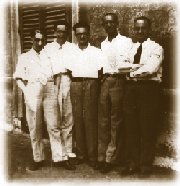
|
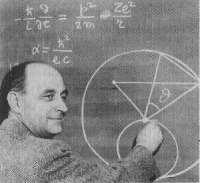
Enrico Fermi |
Enrico Fermi was born in Rome in 1901,
his father was a manager of the Italian railways. He was attracted by Physics after
reading a 15th century Physics book found in a stall of a popular market in Rome.
When he passed the admission examination at the Physics University in Pisa (19 y.o.),
the Professors were surprised of his answers and had to ask him to explain his theories.
At the University, instead of learning, he often taught, replacing the teachers.
At 25 y.o. he was already a University Professor, of a new chair prepared for him:
Atomic Physics. |
In the experiments in the department in Via Panisperna, organized with very simple, often self-made
laboratory tools and materials, Fermi and the "boys" discovered how to bombard heavy
metals with nuclear particles. The bombardment lead to the fragmentation of nucleuses and hence
to the discovery of new heavy metals, to the generation of nuclear energy, and also potentially
to chain reactions (i.e. particles of the bombarded nucleus would then do the same with neighbouring
nucleuses). |

Orso Mario Corbino (Director). |
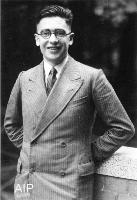
Emilio Segre |
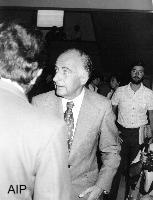
Bruno Pontecorvo |
Initially, the aim of such researches was entirely peaceful, and was to find new therapies
to eradicate cancers. All their discoveries were in fact licensed as therapeutical measures.
Unfortunately, Fermi experienced the discrimination against the Jews, which led to
the 1938 Racial Laws of the Italian Fascist state. Fermi was not a Jew, but his wife
was. Moreover, his protectors, Guglielmo Marconi and the director of the Physics Institute
died. So in 1938, after having personally received the Nobel Price in Sweden, he did
not return to Italy, going straight to Chicago. He began teaching at the University
of Columbia in New York. With his theories, and following also the suggestion of Leo
Szilard (Hungarian), he discovered the chain reaction of nuclear energy.
He
took part of the "Manhattan" project to build a nuclear bomb, under the
command of Gen. Groves, and whose premises were at Los Alamos. The project was kept
utmost secret, to the point that the locations with the plants were removed from
maps, and that also vice-president Truman, once he came into office, knew nothing
of the project.
Szilard tried to convince the others scientists and the US government not to use the bomb because
of its devastating effects. |
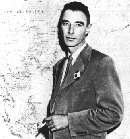
Robert Oppenheimer |
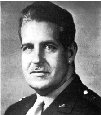
Gen. Groves |
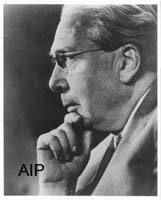
Szilard |
|



